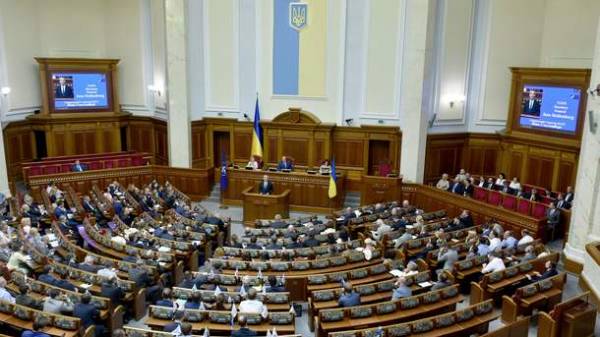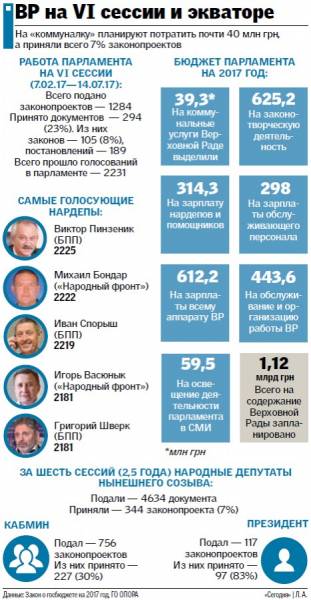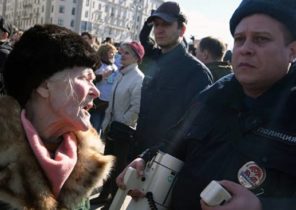
Today people’s deputies officially gone on summer vacation. Although the room last time they were going back on 14 July, last week parliamentarians officially worked with voters.
“Today” has learned how effective was the Verkhovna Rada during the sixth session (see infographic) and what about the work of MPs the experts think.

WORK IN THE HALL
The past political season once again confirmed that the legislative efficiency of the Ukrainian Parliament does not exceed 10%. For example, in the sixth session, which lasted from early February until mid-July, was submitted 1284 bill, of which the laws were only 104 of document (8%). The same figures give the experts of the OPORA network, analyzed the activities of BP over the 2.5 years (this summer the Parliament passed the equator of his work). According to them, since November 2014, the people’s deputies registered 4634 project, of which the “green light” in the session hall only got 344 (7%). In General, if we consider the projects submitted by the Cabinet and the President of Ukraine (5507), the Parliament adopted 12% of all documents (law 661).
- See also: Absentees in Parliament: four MPs did not attend a single meeting
While the Committee of voters of Ukraine add: a total of 45 people’s deputies during the sixth session called for 100% of plenary meetings (held 65). Another 153 people attended 90-99% and 49 parliamentarians missed at least half of all meetings. Three of the most disciplined factions in Parliament is as follows: “people’s front” — on average, 85% of visits, BPP — 84%, “Batkivshchyna” — 80%. In public organizations note that the best MPs went to work in June, and the worst — in February.
COMMITTEES
Parliamentary committees, according to the analyst of the social network SUPPORT Andrew Tokarski at this session began to work clearer: this spring on their sites published more information (reports, transcripts, audio recordings) in the fall of 2016. Tokarski adds: there is positive dynamics showed 21 the Committee, three had not changed their public policy, but of the three it has worsened. However, from the practice to file bills in other committees, MPs refused such in Parliament gained 70%.
“Among deputies there are even some who for 2.5 years operation has not submitted a single bill relating to the reporting of committees to which they belong. This list includes 32 parliamentarians,” — says the analyst. According to him, during this time, the most popular of the deputies was the Committee on legislative support of law enforcement activities (43,9% of all submitted documents), and the most unpopular — the Committee on European integration (1,17%).
EXPERTS
According to political analyst Vladimir Fesenko, the outcome of the sixth session can be called controversial: “the Most productive was the last one and a half months, although the key events took place during the last plenary week. But the first half I would say almost the entrance. In the end, most of the reform laws adopted in the first reading, or not fully, like healthcare reform. Therefore, the effectiveness of the reformist deputies in this respect I would rate in the top three with a minus”.
In turn politekspert Ruslan Bortnik said that the number of bills which became laws, is consistent with the norm.
“It’s not as small as it seems. A very large number of bills are served for the purpose of self-promotion”, — he concluded.







